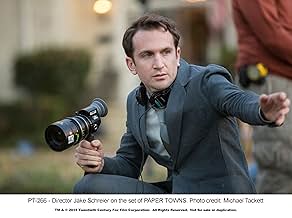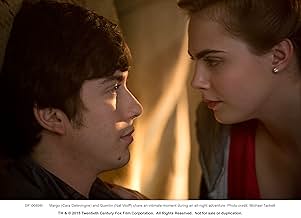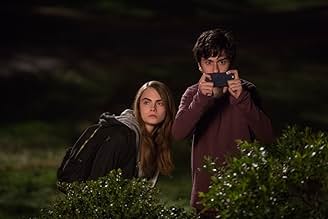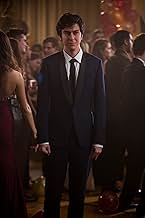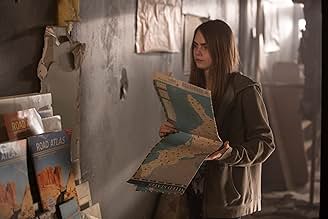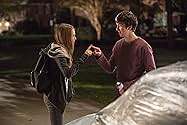NOTE IMDb
6,2/10
110 k
MA NOTE
Après une aventure qui dure toute la nuit, le coup de foudre de Quentin, Margo, disparaît, laissant derrière des indices que Quentin et ses vont tenter de suivre.Après une aventure qui dure toute la nuit, le coup de foudre de Quentin, Margo, disparaît, laissant derrière des indices que Quentin et ses vont tenter de suivre.Après une aventure qui dure toute la nuit, le coup de foudre de Quentin, Margo, disparaît, laissant derrière des indices que Quentin et ses vont tenter de suivre.
- Réalisation
- Scénario
- Casting principal
- Récompenses
- 4 victoires et 3 nominations au total
Hannah Riley
- Young Margo
- (as Hannah Alligood)
Avis à la une
Coming on the heels of its commercially-successful predecessor, 'The Fault in Our Stars', PAPER TOWNS is no heavy tearjerker, but it echoes more affectionate and piercing sentiments, with its lighter, minimalist take of its recognizable subjects.
The film follows Quentin (Nat Wolff) , or "Q" as he is more popularly called, a highschool boy who has been nursing an unrequited love for the girl living next door, Margo (Cara Delevigne) since childhood. Even after when they turn 12, when Margo suddenly becomes distant, "Q" never loses the affection, and it only becomes even stronger when one day she climbs again to his window, the way she did when they were still kids. The next events follow an eager "Q" savoring the moment as he escorts Margo in her series of "small revenge" against those she thinks have betrayed her, including her ex-boyfriend. But the levitating moment would only last overnight, because the next day, the ever mystifying Margo, disappears.
Mining on the same overly familiar material that dwells on both coming-of-age and teenage romance territories, PAPER TOWNS pulls off two easily-recognizable efforts: maintaining 'The Fault's charm, while toning down its tragic notions. The latter of which, yields a more tangible and heartwarming result, capable of conjuring a lasting tug at the heartstrings. The credit for this goes to its equally-charming yet capable actors, both of whom teeming with fresh and enigmatic likability. It will also sound unforgivable to never pay regard to the film's brilliant screenwriters who manage to cleverly highlight this extremely familiar highschool tale's stronger and more relatable sentiments, genuinely and sincerely enough, to bend fragile emotions with crippling capacity.
"Q"'s road trip in finding Margo represents a bigger journey with far wider scope and meaning, and it comes across as a process of personal exploration that unknowingly liberates one self, toward finding the deeper sense of their existence. Hardly that the questions thrown get resolved, but the charming and sincere take of its proceedings, will ultimately make the narrative arrive to a satisfying conclusion. This doesn't mean it's able to satisfy its own queries, but the resolution delivered are nonetheless, reliable and honest.
PAPER TOWNS will come across as a witty, yet touching case of a 'lost and found'. Much of it is spent in searching for the 'lost', a liberating process that frees its seekers from every question that unfolds in the wake of a previous other, but the 'found', though never really answers any of the previous questions, will deliver a surprisingly satisfying, and never less of a rewarding, answer.
The film follows Quentin (Nat Wolff) , or "Q" as he is more popularly called, a highschool boy who has been nursing an unrequited love for the girl living next door, Margo (Cara Delevigne) since childhood. Even after when they turn 12, when Margo suddenly becomes distant, "Q" never loses the affection, and it only becomes even stronger when one day she climbs again to his window, the way she did when they were still kids. The next events follow an eager "Q" savoring the moment as he escorts Margo in her series of "small revenge" against those she thinks have betrayed her, including her ex-boyfriend. But the levitating moment would only last overnight, because the next day, the ever mystifying Margo, disappears.
Mining on the same overly familiar material that dwells on both coming-of-age and teenage romance territories, PAPER TOWNS pulls off two easily-recognizable efforts: maintaining 'The Fault's charm, while toning down its tragic notions. The latter of which, yields a more tangible and heartwarming result, capable of conjuring a lasting tug at the heartstrings. The credit for this goes to its equally-charming yet capable actors, both of whom teeming with fresh and enigmatic likability. It will also sound unforgivable to never pay regard to the film's brilliant screenwriters who manage to cleverly highlight this extremely familiar highschool tale's stronger and more relatable sentiments, genuinely and sincerely enough, to bend fragile emotions with crippling capacity.
"Q"'s road trip in finding Margo represents a bigger journey with far wider scope and meaning, and it comes across as a process of personal exploration that unknowingly liberates one self, toward finding the deeper sense of their existence. Hardly that the questions thrown get resolved, but the charming and sincere take of its proceedings, will ultimately make the narrative arrive to a satisfying conclusion. This doesn't mean it's able to satisfy its own queries, but the resolution delivered are nonetheless, reliable and honest.
PAPER TOWNS will come across as a witty, yet touching case of a 'lost and found'. Much of it is spent in searching for the 'lost', a liberating process that frees its seekers from every question that unfolds in the wake of a previous other, but the 'found', though never really answers any of the previous questions, will deliver a surprisingly satisfying, and never less of a rewarding, answer.
Reviewed by: Dare Devil Kid (DDK)
Rating: 3.4/5 stars
"Paper Towns" isn't as deep or moving as it wants to be, yet it's still earnest, well-acted, and thoughtful enough to earn a place in the hearts of teen filmgoers of all ages while providing a breezy, light-hearted nostalgic trip for adult viewers. Unlike "The Fault in Our Stars" (the first, big-screen John Green adaptation), the overall mood here is safe rather than edgy, but what it does do very effectively is capture a particular quality of adolescent yearning.
"Paper Towns" follows the familiar story of the wannabe high- schooler who meets a dreamy girl and everything falls into place. Trying to subvert this stereotypical storyline, the film neatly weaves themes of loneliness, fear, depression, and anxiety into the plot. The film takes a lot of the original spirit of the novel while subverting the story, taking out all the meandering teenage angst and replacing it with a fun, understated film.
It's eventually a bittersweet teen film with much to offer even those of us who have, in theory, grown up, although it never quite reaches its potential of a remarkable coming-of-age drama.
Rating: 3.4/5 stars
"Paper Towns" isn't as deep or moving as it wants to be, yet it's still earnest, well-acted, and thoughtful enough to earn a place in the hearts of teen filmgoers of all ages while providing a breezy, light-hearted nostalgic trip for adult viewers. Unlike "The Fault in Our Stars" (the first, big-screen John Green adaptation), the overall mood here is safe rather than edgy, but what it does do very effectively is capture a particular quality of adolescent yearning.
"Paper Towns" follows the familiar story of the wannabe high- schooler who meets a dreamy girl and everything falls into place. Trying to subvert this stereotypical storyline, the film neatly weaves themes of loneliness, fear, depression, and anxiety into the plot. The film takes a lot of the original spirit of the novel while subverting the story, taking out all the meandering teenage angst and replacing it with a fun, understated film.
It's eventually a bittersweet teen film with much to offer even those of us who have, in theory, grown up, although it never quite reaches its potential of a remarkable coming-of-age drama.
Paper Towns is another coming-of-age story about Quentin and his neighbour Margo and how here mysterious disappearance sends Quentin on a journey to find her through clues she left behind for him. Now i love a good coming-of-age story, so when one is done right and is new and interesting it will probably be something i choose to watch more than once. Unfortunately this will not be one i am eager to re-watch but it is still a good, strong attempt at one of these films but it seems to get lost a few times along the way in terms of its storytelling. I'll start with the characters and performances, because i feel they were definitely the best parts of the film and added so much to making the film pretty enjoyable. Nat Wolff was great at playing Quentin, a shy awkward guy who had a signs of a lot of personality but needed the right people to bring it out. You really get to connect with his character as they made him come across as very real and not like a character per se. I may say that often but there are so many young actors really showing off their best stuff in these smaller personal films. Cara Delevingne was also great as Margo who was also quite odd and mysterious but was also very out there and confident at the same time, a great contrast to Nat's character. The rest of the supporting cast were also well acted, their distinct personalities were at times used for some cheap comedic relief but also had a greater purpose in adding to the complexity of our main character.
The first act of this film is really where the film gets to shine. You get the introduction to these characters (Quentin and Margo) and get to see their relationship and how it has changed and affected both these characters in the lead up to the events in the film. Watching them interact and bond was fascinating and charming at times and was a really good lead up into the events of the second act and understanding their actions. It was fun, light-hearted and was setting itself up for something great. All of the events so far had a fluid lead in to the second act which became more of a mysterious adventure whilst still trying to maintain that fun element somewhat unsuccessfully. The events of the first act are what get you through the very long second act that could have been cut down like 20 minutes. The second act was more focused on building up Quentin's character and having him face some tough and new decisions in his life. Although it was interesting and you do want to see where his character goes it was a noticeable step down from the fun light-hearted enjoyment in the beginning. There was this great interesting relationship set up and you are eager to find out how the film ties everything together, then you reach the third act and all of the storytelling falls apart.
For certain characters, their actions and reactions seem somewhat justified but for some others they just felt like another character entirely. There was nothing in the second act that really explained how or why these characters made such a drastic change in reasoning or personality. They try to explain it in the dying minutes but it was very rushed and didn't fit with the rest of the film. The problem was that there was no real progression from the events of the beginning to the events in the end for some characters and that led me to believe that the writers/directors knew how to approach certain sections but were completely lost for others. I believe, they knew how they wanted the film to begin and how to introduce these characters, and they also knew how they wanted it to end and what themes they wanted to explore. But what they didn't know was how to show that transition, and when a film has the beginning, and has the end it can be hard to fill in the guts of the film afterwards and show a distinct character progression. That's just my theory but whatever happened the storytelling was a bit of a mess.
That being said, it was still a good enjoyable film that tried too hard to be different or maybe not hard enough. It had great characters and performances, a fantastic first act, an interesting second act and a third act that didn't live up to what the rest of the film was building up to. Humour didn't really work that often but kept the film from becoming too dark, and there were signs of emotion but nothing that really affects you. In the end, it's enjoyable but there are better coming-of-age films out there (Boyhood / Me and Earl and the Dying Girl). - 6.3
The first act of this film is really where the film gets to shine. You get the introduction to these characters (Quentin and Margo) and get to see their relationship and how it has changed and affected both these characters in the lead up to the events in the film. Watching them interact and bond was fascinating and charming at times and was a really good lead up into the events of the second act and understanding their actions. It was fun, light-hearted and was setting itself up for something great. All of the events so far had a fluid lead in to the second act which became more of a mysterious adventure whilst still trying to maintain that fun element somewhat unsuccessfully. The events of the first act are what get you through the very long second act that could have been cut down like 20 minutes. The second act was more focused on building up Quentin's character and having him face some tough and new decisions in his life. Although it was interesting and you do want to see where his character goes it was a noticeable step down from the fun light-hearted enjoyment in the beginning. There was this great interesting relationship set up and you are eager to find out how the film ties everything together, then you reach the third act and all of the storytelling falls apart.
For certain characters, their actions and reactions seem somewhat justified but for some others they just felt like another character entirely. There was nothing in the second act that really explained how or why these characters made such a drastic change in reasoning or personality. They try to explain it in the dying minutes but it was very rushed and didn't fit with the rest of the film. The problem was that there was no real progression from the events of the beginning to the events in the end for some characters and that led me to believe that the writers/directors knew how to approach certain sections but were completely lost for others. I believe, they knew how they wanted the film to begin and how to introduce these characters, and they also knew how they wanted it to end and what themes they wanted to explore. But what they didn't know was how to show that transition, and when a film has the beginning, and has the end it can be hard to fill in the guts of the film afterwards and show a distinct character progression. That's just my theory but whatever happened the storytelling was a bit of a mess.
That being said, it was still a good enjoyable film that tried too hard to be different or maybe not hard enough. It had great characters and performances, a fantastic first act, an interesting second act and a third act that didn't live up to what the rest of the film was building up to. Humour didn't really work that often but kept the film from becoming too dark, and there were signs of emotion but nothing that really affects you. In the end, it's enjoyable but there are better coming-of-age films out there (Boyhood / Me and Earl and the Dying Girl). - 6.3
The first twenty minutes absolutely blew me away, totally enjoyable, when she'd disappeared I honestly thought it was going to be a kind of Gone Girl thriller, wrong, it fell somewhere between Road Trip and the Goonies. After adjusting to what essentially became a teenage road trip movie I kind of enjoyed it, there were some entertaining moments. I couldn't help feeling a little bit robbed, it had been set up so well, it literally felt like a different film after her disappearance.
The ending at least was one that decided not to pander to audience satisfaction, a little sour but interesting. As always with this kind of film the usual clichés are there in full, point zero as is the rule is the prom, they always have to be motivated by the prom.
Interesting casting, Nat Wolff was very good as Quentin, he didn't overplay it, very enjoyable. I will applaud the decision to cast Cara as Margo, maybe not the top of many lists but I felt her personality and natural self gave Margo her enigma and mysterious edge, I thought she was very good, the accent slipped to English on a few occasions, but that can be forgiven, I hope it's a springboard for her I like her.
6/10 It was good, it should have been so much more.
The ending at least was one that decided not to pander to audience satisfaction, a little sour but interesting. As always with this kind of film the usual clichés are there in full, point zero as is the rule is the prom, they always have to be motivated by the prom.
Interesting casting, Nat Wolff was very good as Quentin, he didn't overplay it, very enjoyable. I will applaud the decision to cast Cara as Margo, maybe not the top of many lists but I felt her personality and natural self gave Margo her enigma and mysterious edge, I thought she was very good, the accent slipped to English on a few occasions, but that can be forgiven, I hope it's a springboard for her I like her.
6/10 It was good, it should have been so much more.
Maybe I'm getting old. These over-serious, platitude-filled teen dramas used to only mildly annoy me. Now, with Paper Towns, I feel myself getting irrationally angry at its desperate plea to be this generation's The Breakfast Club. From where is that resentment coming? Maybe it's that I'm a 30-year-old married-father who's not meant to like this movie. Maybe it's that I'm coming off the high of the teen drama Me and Earl and the Dying Girl. Whatever it is, Paper Towns irritated much more than it charmed. The premise has potential: nerd spends one magically frivolous night with the enigmatic girl of his dreams, Margot, before she inexplicably disappears. Instead of being unique, stylish, or progressive, it becomes the lament of the rich-white-teen and the manic pixie dream girl. Our "hero" is drawn to her magnetic mystery, but that appeal never reaches the audience. At times, she represents an idea more than a character, but mostly she's an unbearably selfish, manipulative shrew, using her womanly wiles to get whatever she needs. When she's off-screen, the interplay between the friends is watchable, but her bothersome presence is never far away. Worst yet, in the end PT never takes a stance on Margot, like the movie is trying to have its cake and eat it too. Stylistically, the movie is forcefully quirky, annoyingly cutesy, and boasts a soundtrack that's like someone pushed the "hipster" button on a Casio Keyboard. We can only blame director Schreier, whose previous film was the under-seen Robot and Frank. Just stay home and watch that, a story about a machine with more humanity than anyone in PT.
Le saviez-vous
- AnecdotesJohn Green: The author, as the voice of the shotgun-wielding father of Becca.
- GaffesWhen Quentin enters the washroom at the party, the shower curtains are already open, but then later on you see Lacey opening the shower curtains.
- Citations
Quentin Jacobsen: What a treacherous thing to believe that a person is more than a person.
Meilleurs choix
Connectez-vous pour évaluer et suivre la liste de favoris afin de recevoir des recommandations personnalisées
- How long is Paper Towns?Alimenté par Alexa
Détails
Box-office
- Budget
- 12 000 000 $US (estimé)
- Montant brut aux États-Unis et au Canada
- 32 000 304 $US
- Week-end de sortie aux États-Unis et au Canada
- 12 650 140 $US
- 26 juil. 2015
- Montant brut mondial
- 85 512 300 $US
- Durée
- 1h 49min(109 min)
- Couleur
- Mixage
- Rapport de forme
- 2.35 : 1
Contribuer à cette page
Suggérer une modification ou ajouter du contenu manquant







